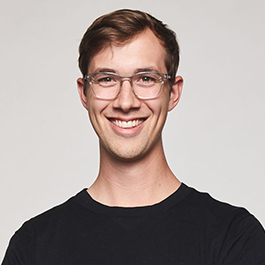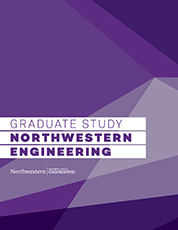Seph LangSenior Industrial Designer, IDEO.org

Alumni Interview
"Soon after starting EDI I quickly became aware of how much broader the reach of 'design as a tool' was than I had initially understood. Gaining greater clarity around the role design can play at both the tangible and ethereal levels through EDI's courses helped shift my focus to finding a more multi-disciplinary design role after graduating."
When you started EDI, did you know what industry you wanted to work in or were you still exploring?
I didn't have a clue. Honestly, I am not even sure I had a clear perspective of what a designer was. When I started the EDI program I was coming out of my undergraduate physics education and felt like I was discovering an entirely new world. Up to that point, I had generally assumed my path would lead me to become some version of a Mechanical Engineer at a cool company with cool design, an Apple or a Tesla. Soon after starting EDI I quickly became aware of how much broader the reach of 'design as a tool' was than I had initially understood. Gaining greater clarity around the role design can play at both the tangible and ethereal levels through EDI's courses helped shift my focus to finding a more multi-disciplinary design role after graduating. I had always had a passion for sustainability, energy, and agriculture, particularly in the developing world. With my newly acquired HCD mindset, it was no major leap to recognize how many people, industries, and often overlooked corners of the world are perfectly positioned to benefit from an HCD mentality to improve their communities. Ultimately, I landed at IDEO.org and couldn't have asked for a more ideal scenario. I have had the opportunity to design across cultures, across topic areas, and across disciplines all while tackling what I consider to be some of the most urgent challenges human society currently faces.
Tell us about an EDI course that made an impact on you.
Design Strategy with Professor Greg Holderfield was the course that helped crystallize my perspective of design and allowed me to understand the type of designer I wanted to become. Many of the courses I took towards the beginning of EDI were really interesting and clearly valuable from a skills development standpoint, but collectively I felt they had yet to paint a realistic path for me to implement my particular skill set in a professional design setting; Design Strategy helped me to visualize that path. While I am anchored in the world of tangible design (i.e. physical products and environments), I very much consider myself a generalist who enjoys playing in the spheres of systems, strategy, and service design. Midway through EDI I was anxious about not being specialized enough and no one wanting to hire me, so I kept thinking about all my areas of design interest I would need to abandon. Design Strategy shifted that. It helped me recognize how my varied skill set could be applied as an amplifier rather than a handicap. It showed me that design is not only about the beautiful product that rolls off the assembly line, but equally beautiful is the design of the system behind scenes, the strategy, the service architecture.
Is there anyone you worked with during EDI that you consider a mentor?
Craig Sampson is one of the most thought-provoking professors I've ever had. He served as the bookends to my EDI experience as he taught the first grad class I ever stepped into and then invited me to TA a class for him during my final quarter at Northwestern. Beyond all the design insight he shared in his classes and career guidance chats over coffee, the main nugget I absorbed from Craig is to embrace a bit of the ridiculousness sometimes. It started from the first project in his class where he pushed us to reimagined the function of everyday objects and I completely underestimated the level of weird he was wanting us to push things
How did you decide on your EDI thesis project?
My thesis project resulted from an amazing alignment of many factors. During the first two quarters of EDI, I spent hours trying to determine how to most effectively spend this wild opportunity to explore whatever I wanted for nine months. Stemming from my enjoyment of a previous EDI assignment and a years-long curiosity about design in the developing world I had general narrowed my focus to something related to sustainability in developing countries. By pure coincidence, the year of my thesis several classmates and I were presented with the opportunity to work alongside IDEO designers on an agriculture project for Ethiopia. Over the course of almost a year, my five teammates and I worked with IDEO to iterate on the design of a potentially revolutionary piece of farming equipment for Ethiopia's smallholder farmers. We crafted unique and often strange design concepts, we built prototypes, we traveled to Ethiopia, we engaged with local farmers, we ran tests, broke things, learned a lot, and ultimately delivered a refined product design with implementation outline. It was a fantastic experience and ultimately helped land me in my current role at IDEO.
What advice do you have for an EDI student interested in working in your industry?
For the type of work I do, having the ability to function at varying levels of design is imperative. I consider the world of social impact design to be in a unique realm of design that requires quite of bit of versatility and a true ability to embrace ambiguity from its designers. It is certainly useful to develop a deeper area of craft expertise that you can leverage as your superpower on design teams, but in my experience with social impact design, it is equally valuable to have a moderate amount of knowledge across a wider range of design disciplines. Much of the work we do is thinking and strategizing at the service and systems levels while simultaneously delivering at the tangible and implementation level. This requires a lot of flexibility as a designer, and the program experience of EDI does a great job of introducing you to a large spectrum of design disciplines and then providing you the freedom to anchor and excel in your area(s) of preference. My main tidbit of advice is to focus on getting the most out of each class and experience, you never know when the dots will appear for you to connect.

